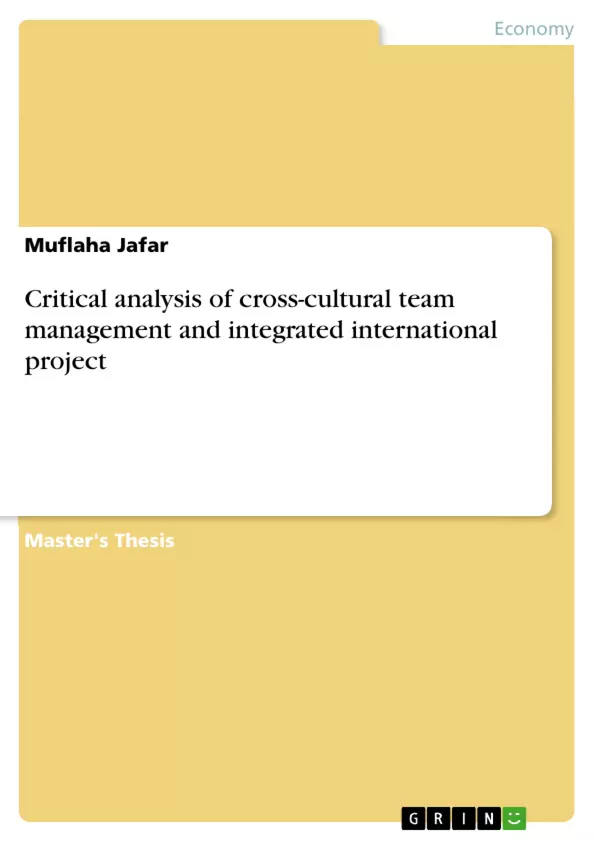This research critically analyses the management of cross-cultural teams within integrated international projects that explore both risks and opportunities. With increasing globalisation, diverse team offers many benefits such as innovation, problem solving capabilities and broader perspectives. However, there are a lot of challenges also like cultural misunderstanding, communication barriers, trust issues and different decision making processes that can significantly affect project performance. The study also conducted a survey of 90 participants that help in revealing that communication barriers and culture differences are the most common issues faced by cross culture teams. To manage these challenges, there are some significant strategies such as inclusive leadership, cross cultural training and establishing proper communication Portugal that identified as crucial for improving cross culture team dynamics. These approaches increase collaboration trust and cohesion between cross culture teams that ultimately helps in improving the outcomes of the project in terms of quality, timelines as well as stakeholders’ satisfaction.
Inhaltsverzeichnis (Table of Contents)
- Chapter 1: Introduction
- 1.1 Introduction
- 1.2 Background
- 1.3 Problem Statement
- 1.4 Rationale
- 1.5 Aim
- 1.6 Objectives
- 1.7 Questions
- 1.8 Significance
- 1.9 Structure
- 1.10 Chapter summary
- Chapter 2: Literature Review
- 2.1 Introduction
- Theoretical Framework
- Conceptual Framework
- Literature Gap
- Chapter Summary
- Chapter 3: Research Methodology
- 3.1 Introduction
- 3.2 Research Philosophy
- 3.3 Research Design
- 3.4 Research Approach
- 3.5 Research Choice
- 3.6 Inclusion and Exclusion Criteria
- 3.7 Research Strategy
- 3.8 Time Horizon
- 3.9 Data Collection Method
- 3.10 Data Analysis Tools and Techniques
- 3.11 Sampling Techniques
- 3.12 Ethical Considerations
- 3.13 Research Timeline
- 3.14 Summary
- Chapter 4: Data Analysis
- 4.1 Introduction
- 4.2 Survey Analysis
- 4.3 Correlation Analysis
- 4.4 Regression Analysis
- 4.5 Summary
- Chapter 5: Data Findings & Discussion
- 5.1 Introduction
- 5.2 Research triangulation
- 5.3 Discussion of research themes
- 5.4 Summary
Zielsetzung und Themenschwerpunkte (Objectives and Key Themes)
This research aims to critically analyze the management of cross-cultural teams within integrated international projects, exploring both the opportunities and risks involved. The study investigates the challenges and benefits associated with diverse teams in a globalized context.
- Challenges of managing cross-cultural teams in international projects.
- Strategies for effective cross-cultural team management.
- Impact of cultural differences on project performance.
- Opportunities presented by diverse teams in international projects.
- Framework for improving cross-cultural team dynamics.
Zusammenfassung der Kapitel (Chapter Summaries)
Chapter 1: Introduction provides background information, defines the problem, and outlines the research aims and objectives. Chapter 2: Literature Review examines existing research on cross-cultural team management and identifies gaps in the literature. Chapter 3: Research Methodology details the research design, approach, and data collection methods used in the study. Chapter 4: Data Analysis presents the results of the data analysis techniques employed. Chapter 5: Data Findings & Discussion discusses the key findings of the research and explores relevant themes.
Schlüsselwörter (Keywords)
Cross-cultural team management, international projects, cultural diversity, communication barriers, project performance, inclusive leadership, cross-cultural training, global teams, risk management, opportunity analysis.
- Citation du texte
- Muflaha Jafar (Auteur), 2024, Critical analysis of cross-cultural team management and integrated international project, Munich, GRIN Verlag, https://www.grin.com/document/1508462



